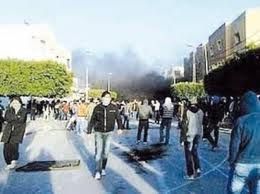 These days, Tahrir Square, in Egypt, was again filled with people and today (Friday, 07/15/2011) in front in the Kasbah of Tunis, police fired tear gas to disperse a demonstration.
These days, Tahrir Square, in Egypt, was again filled with people and today (Friday, 07/15/2011) in front in the Kasbah of Tunis, police fired tear gas to disperse a demonstration.
The love Story between civil society and the army did not last long, but so far there have been a kind of balance. But that balance at this time seems completely broken. The streets are crowded of protesters again, the atmosphere is electrified. It could explode at any moment. The tale of the army friend of the people no longer help children to sleep quietly.
(Photo - Tunisie numerique)
But in Tunisia, things seemed to go much better than this. It was explained to all that the Tunisian army was a neutral institution. For long time kept away from power. Benali's “kingdom” was built on police. 130,000 men in uniform and many other thousands of spies and informers in every street corner. The army was left behind. A handful of career officers looking after a few thousand of young people of the popular military service. Small in number, badly equiped, absent from the political scene.
When, in mid-January, after a consultation with the U.S. Embassy, the major cmmander of the army forces, Rachid Ben Ammar, suggested to Benali that it was better for his safety to embark on the airplane that was leading his family in Saudi Arabia, the public was already prepared to see the army taking power. In fact, days before the legend of General Ben Ammar who disobeyed and refused to shoot on his own people became popular relayed by some national and international media. And in the streets, protesters started greeting the soldiers as comrades in struggle.
In Egypt, things were not so simple. The power in the northern shores of the Nile is in the hands of the army since 1953, the year of the revolution of the Free Officers of Gamal Abdel Nasser.
The Egyptian generals have always been the central pillar of the regime. Nasser was a High officer, so was also Sadat. And Mubarak, even though he never showed himself in uniform like his predecessors, he is also a high range military officer.
The taking of power by the "military council", officially for a democratic transition, has been accepted only because there was no other reasonable choice. The squares of protest after weeks of sit-ins were turning into real battle fields. Police and Baltagia created an absolute reign of terror. The protesters were exhausted and the majority of the people believed quite forcedly in the slogan: "giaish, sciab, yad wahida" (army and people are a single hand).
Today in both countries, the idyll is completely finisced. It is clear that the two governments guarantied by the armies do their best to keep the old system intact. By changing just a little the superficial aspect and implementing some generational change in some not very strategic places.
The fact is that now that the people have taken their to speak, they do no more want to stay silent. And then the clash is inevitable.
At the same time, from Syria, comes some news saying that the army interposed between the protesters and the special forces of the regime in Deraa. This, if confirmed (in this situation, the doubt is always a must), it may mean that some army units began to look for a kind of Egyptian solution.
But at the same time, while in Tahrir Square they are burning under the sun of egiptian summer and in the Casbah they are escaping from poisonous gases of the tunisan army, young Egyptians and Tunisians have realized that what they have done so far can not yet be called “revolution”. That no one gives freedom and rights to anyone, and that maybe ... maybe the real revolution has not started yet.



